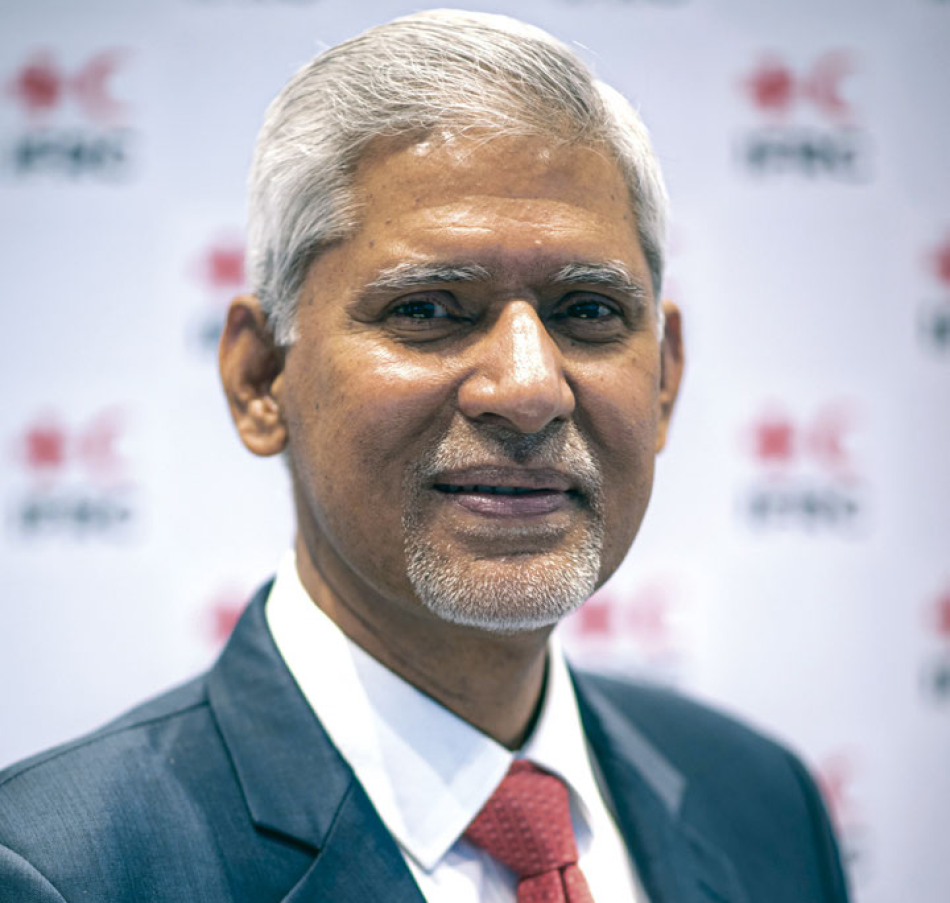AUTO #31 - Global response and local action
Jagan Chapagain, Secretary General of the International Federation of Red Cross and Red Crescent Societies, explains how the IFRC is dealing with the COVID-19 pandemic by empowering its national societies – including in the collaterally affected area of road safety

The COVID-19 pandemic has had a profound impact on the entire global population and for an organisation like the IFRC it must place incredible strain on resources and personnel. Can you outline how the federation has responded to the crisis on a global level? This pandemic has pushed nearly all organisations and industries to limits we have not seen in our lifetime. We continue to constantly adapt and find new ways of working while still meeting the unprecedented humanitarian needs this crisis has created. Every country is at risk of COVID-19, but not all countries are affected in the same way. Collectively, we have shifted our Red Cross Red Crescent response to one that is global yet domestic in reach by supporting our national societies in scaling up health, sanitation and community engagement activities to save lives and meet the specific needs of vulnerable people.
What situation does the IFRC now find itself in with regard to the crisis? What are the next steps the federation is preparing for as we contemplate a second wave? As the number of people infected by COVID-19 drops in some regions, others are experiencing a surge as well as the return of the virus. Red Cross and Red Crescent volunteers around the world are providing medical and mental health care, food and sanitation, and rolling out emergency cash programmes to families who need assistance. They are locals in their own communities engaging in two-way dialogue, building trust and providing life-saving information about protection against the coronavirus.
How has the pandemic impacted on the federation’s other activities? Have there been particular crises that have been exacerbated by the pandemic? The COVID-19 pandemic has worsened the impact of other humanitarian emergencies. Many countries are facing double or triple crises, as COVID-19 merges with climate change and extreme weather. An alarming number of people face serious food shortages, which puts them at increased risk of malnutrition and disease outbreaks. The pandemic has also disrupted progress made against diseases like malaria, measles and tuberculosis as health services have ground to a halt in some areas. Many immunisation campaigns have been suspended all together. We are working with partners to strengthen routine immunisation in hard-to-reach populations and advocating for the international community to commit to a people’s vaccine for COVID-19, when it becomes available. Red Cross and Red Crescent volunteers are providing people with cash, food seeds, tools, malaria bed nets, and medical and mental health care to get them through these multiple crises.
The crisis has stretched resources to the limit everywhere. How important is the €2 million raised by the FIA and the FIA Foundation for the IFRC and its global response to COVID-19 through an online auction in June? The COVID-19 pandemic and associated global recession will worsen health and economic outcomes for vulnerable people in fragile and low-income countries. The funds raised from the online charity auction and FIA Foundation provide an extra safety net and support the important work of Red Cross and Red Crescent national societies around the world to help people affected by COVID-19. Thousands of families can access medical and mental health care, receive cash to help them buy what they need, and receive support from our staff and volunteers to stay informed and healthy. These funds will also be used to purchase more personal protection equipment (PPE) to protect frontline workers so they can connect directly with the most vulnerable and high-risk communities.
The IFRC is the host organisation of the Global Road Safety Partnership. You were a member of the Executive Committee of the GRSP for some time, so can you explain the work of the partnership and how road safety fits in with the IFRC’s overall mission? The key focus of the GRSP is to improve road safety in low- and middle-income countries. The IFRC was the first organisation to identify road trauma as a man-made humanitarian crisis in the 1999 World Disasters Report. The poor, vulnerable and the young are particularly at risk, and the road fatality and serious injury rates are dramatically higher in poorer countries. Some of the key initiatives of the GRSP include programmes to improve road safety laws, educate and train police to prevent road trauma, and the Global Road Safety Leadership Course run jointly with the Johns Hopkins University – Injury Prevention Unit in Baltimore, USA. The GRSP is recognised as a global advocate for improved road safety and has been operating for more than 20 years with a variety of road safety projects across the world. The GRSP’s key strength is bringing together civil society, governments and the private sector in partnerships to improve road safety.
The economic fallout from the COVID-19 pandemic is likely to be profound and there is concern that road fatalities may continue to rise due to an inability by government to invest in much-needed infrastructure, particularly in emerging economies. Is this a major concern for the IFRC and what would you say to politicians about the issue? Improving road and roadside infrastructure is an important economic investment, but there are many other lower-cost interventions that improve road safety. The most tangible intervention is speed reduction. If a country cannot immediately afford to improve a road’s safety infrastructure, it can lower speed limits. The higher the speed, the more likely a vehicle will crash and the more severe the injuries. There are still countries around the world with speed limits that are too high for the safety standards of the road. France recently lowered its rural, non-divided road speed limits to 80km/hour and hundreds of lives were saved. Other countries must show the same courage and commitment to act and invest in evidenced-based road safety measures that work.
The IFRC has been involved in a partnership with the FIA since 2014, with a particular focus on post-crash care. How important is this in helping to save lives on the road? Post-crash response is one of the key pillars of road safety and involves the safe extraction of victims after collisions by rescue services, immediate trauma care by well-trained paramedics, hospital trauma care and long- term rehabilitation. Many of our Red Cross and Red Crescent national societies operate ambulance services and hospitals, and see the carnage of preventable road crashes every day. In addition, public awareness campaigns that specifically support police enforcement of alcohol-impaired driving, excessive speed and other key risk factors are effective at reducing road trauma. It remains important to focus on these targeted campaigns.
You’re also a member of the FIA’s High Level Panel for Road Safety, which brings together business leaders, diplomats and NGOs to develop innovative solutions to road safety. How important is this kind of public/private/NGO partnership in creating momentum for change? Business, civil society and government leaders have an important part to play in improving road safety. Collectively, we must put in place interventions that we know work. Many countries still do not have adequate seat belt, child restraint and motorcycle helmet laws. Some countries have inadequate drink-driving laws and speed limits remain far too high in many parts of the world. Effective road policing is often absent or of a low priority. It takes political will and commitment to fix these problems. We collectively have a role to keep the pressure on for change and the FIA’s High Level Panel for Road Safety is an important forum where this can happen.
Looking at the broader road safety issue, earlier this year we had the 3rd Ministerial Conference held in Sweden. Were you encouraged by the outcome and the signing of the Stockholm Declaration? I was encouraged by the strong commitment demonstrated in Stockholm to reduce the road trauma burden with so many ministerial delegations in attendance. Here is a simple and effective message to governments and drivers everywhere, which I quote from Lord Robertson’s opening address at the conference: “There is one policy guaranteed to help worldwide: Slow Down!” Slowing down not only reduces serious crashes, but also helps slow down greenhouse gas emissions – another global priority that must be addressed. It is also important that police are supported and encouraged to focus on excessive speed as a primary crash contributor and a key mechanism to keep the world’s communities safe.”
What do we need to do to deliver on the pledge to reduce road deaths by 50 per cent by 2030? We already have the solutions to reducing road trauma. The ‘Safe System’ approach and the integrated way in which it aims to protect all road users is proven to be effective across the globe. As a result of the COVID-19 pandemic, we now face unprecedented health and socioeconomic challenges. Now more than ever before, improving road safety must be a key priority. No country can afford to ignore road deaths and serious injuries and the costs they inflict on health, rehabilitation and social welfare systems. The economic and social costs of road trauma are enormous and will put more pressure on health systems at a time when countries cannot afford this. It is important that people avoid serious injury that requires hospital care and can live valuable and productive lives. Road trauma remains a man-made yet preventable humanitarian crisis.
Finally, how do you see the COVID-19 crisis evolving over the coming months, and what message would you like to deliver to the readers of AUTO and the FIA’s members? I am grateful and proud of the long-standing partnership between the FIA and IFRC. This has been a team effort since day one, and I look forward to continuing that progress in the months ahead. COVID-19 continues to spread exponentially in many parts of the world and will continue to do so in the months to come in the absence of an effective vaccine. The FIA has an incredibly important and ongoing role to help stop the spread of COVID-19. Promoting simple actions can save lives. The three W’s – wash your hands thoroughly, wear a mask and watch your distance – are proven to help stop the spread of COVID-19. We should also take care of our community by checking in regularly to make sure our family, friends and neighbours are well and safe. It is important that we work together collectively and in solidarity, and that we stay the course even when it’s difficult or inconvenient. If we all play our part, we can defeat this virus.

 Facebook
Facebook Twitter
Twitter






